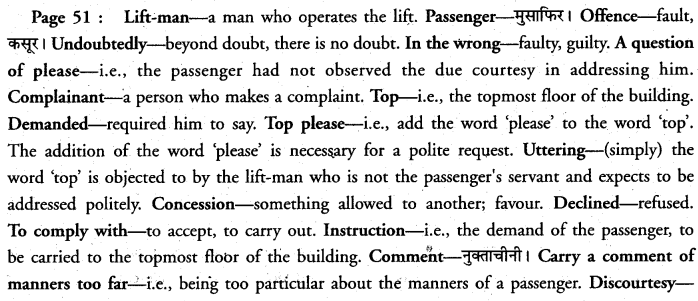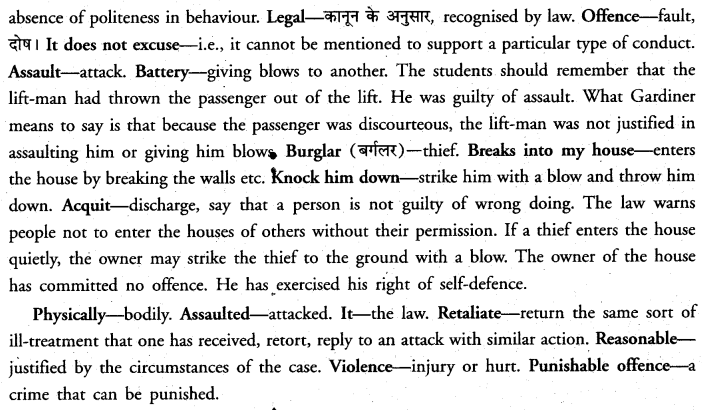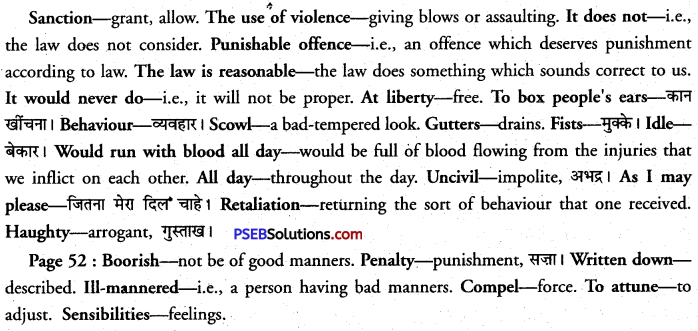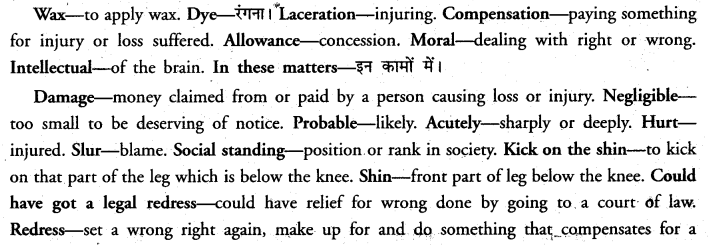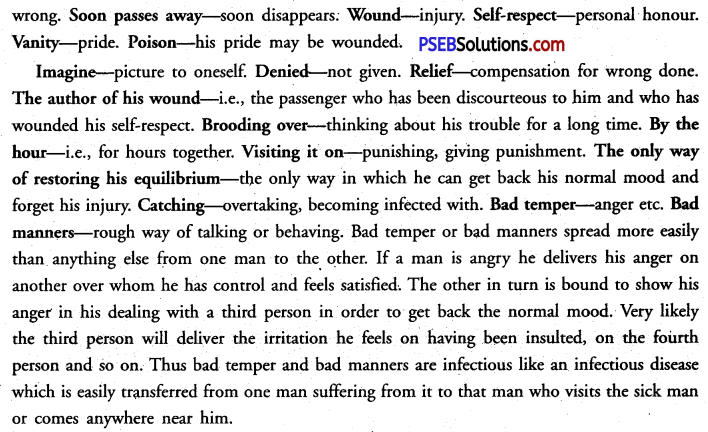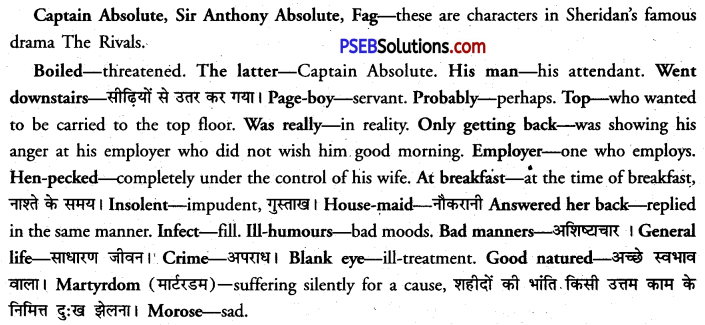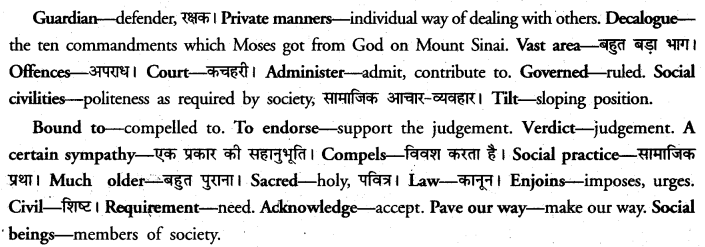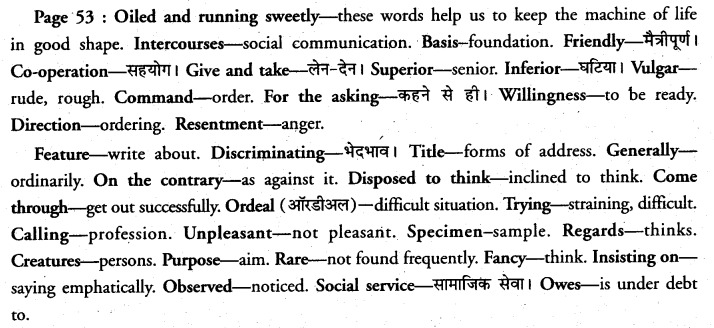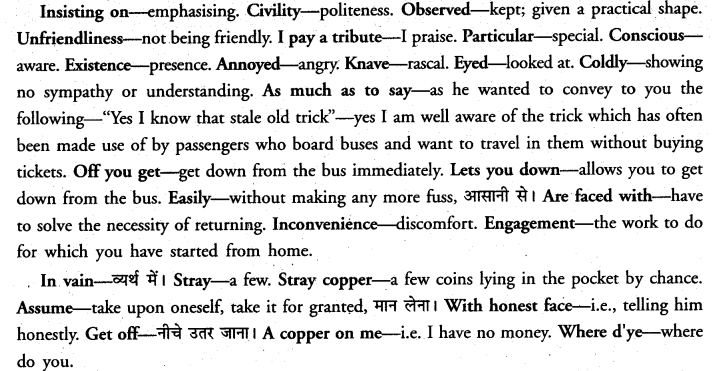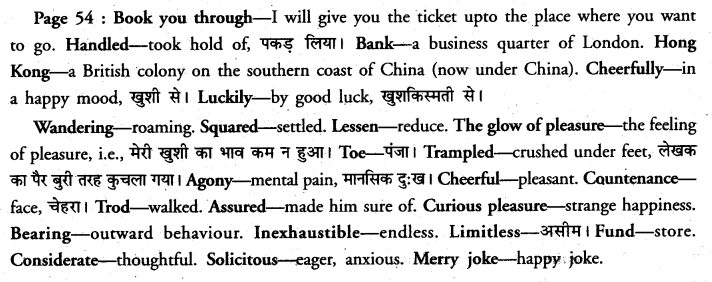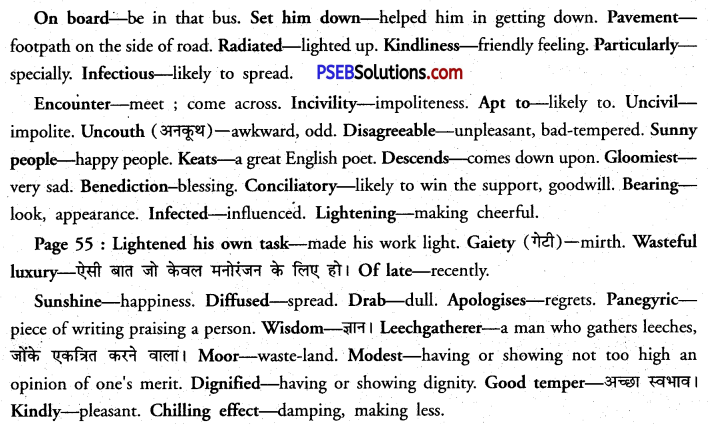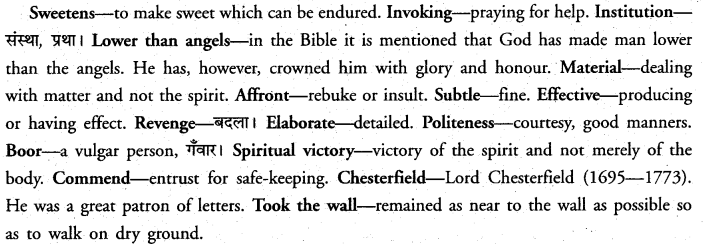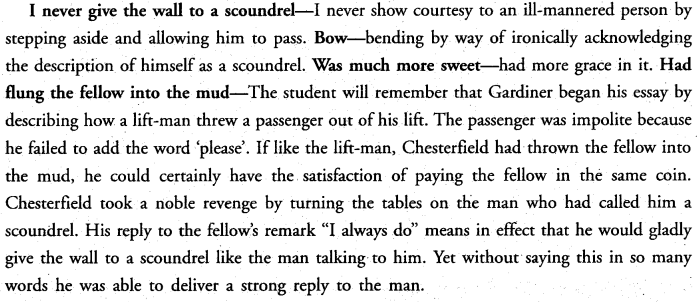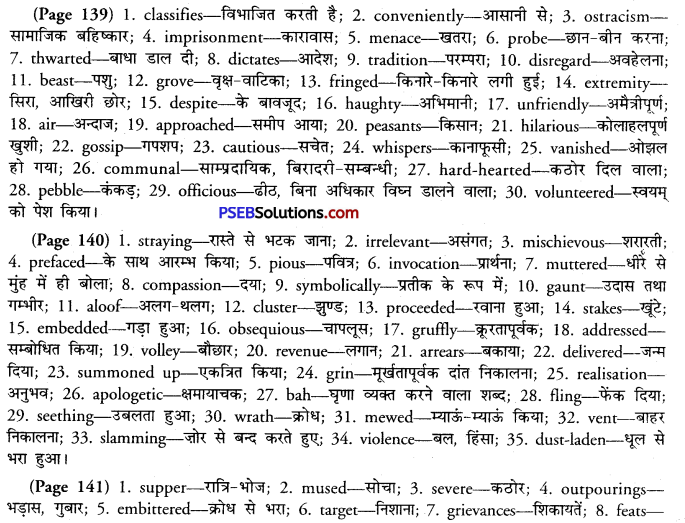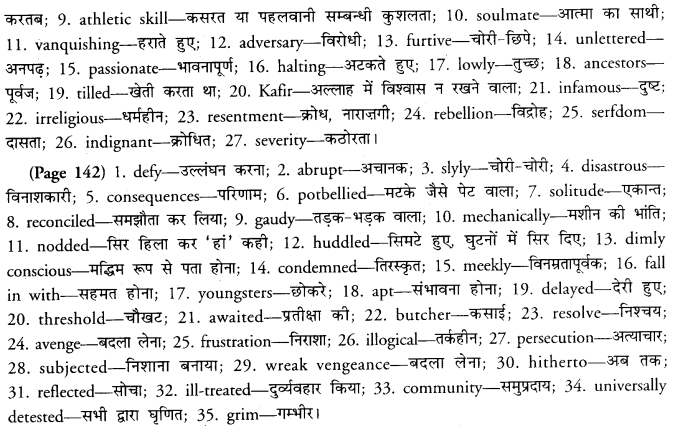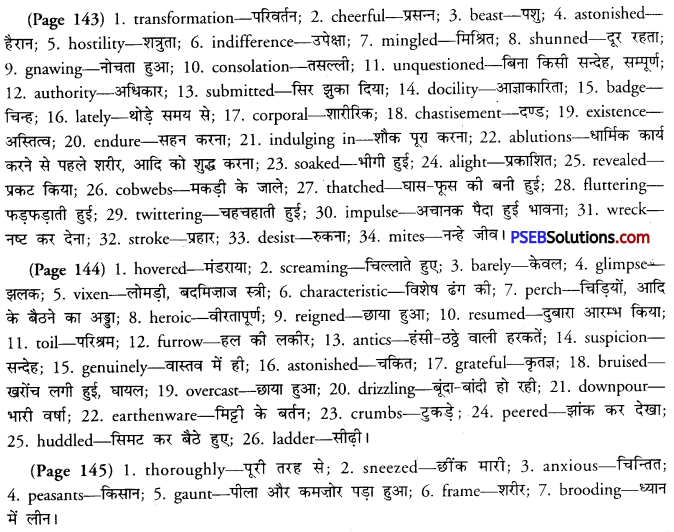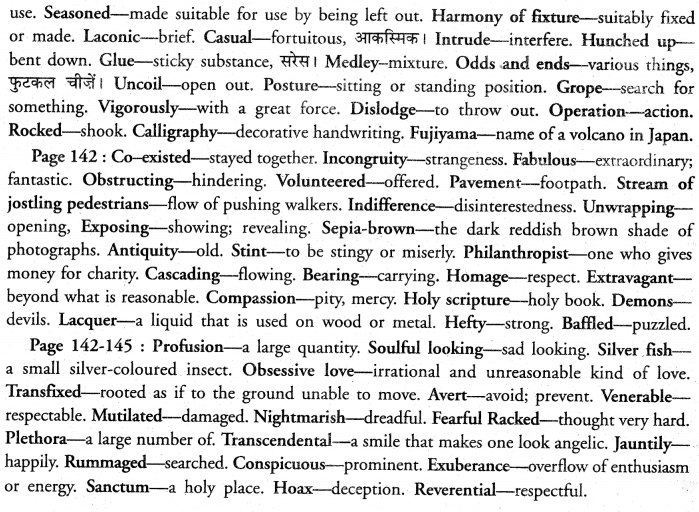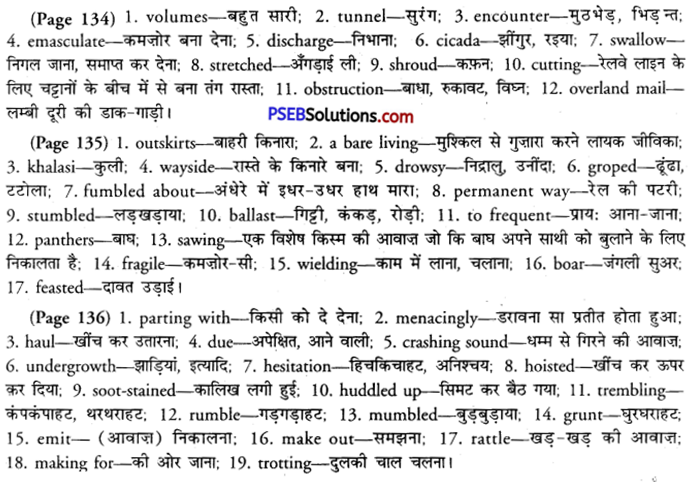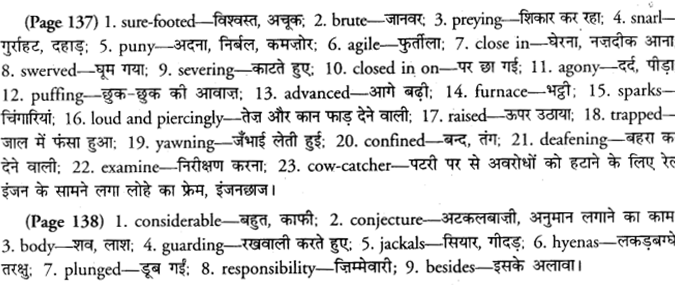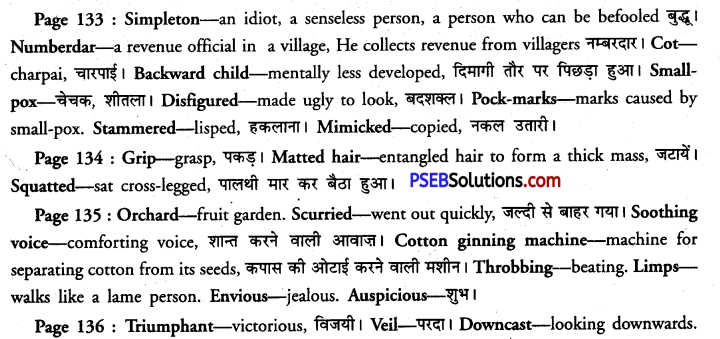Punjab State Board PSEB 11th Class English Book Solutions Chapter 1 Gender Bias Textbook Exercise Questions and Answers.
Class 11th English Book Chapter 1 Gender Bias Question Answers
Gender Bias Class 11 Questions and Answers
Short Answer Type Questions
Question 1.
What course was the author pursuing at the Indian Institute of Science, Bangalore ?
Answer:
Sudha Murthy, the author of this chapter, was very bright at studies. She was pursuing her M.Tech. course at the Indian Institute of Science in Bangalore. At that time, this institute was known as the Tata Institute. She was the only girl in her postgraduate department.
सुधा मूर्थी, इस अध्याय की लेखिका, पढ़ाई में बहुत होशियार थी। वह बेंगलौर के इंडियन इंस्टिट्यूट ऑफ साइंस में अपना एम० टेक० का कोर्स कर रही थी। उस समय इस संस्थान को टाटा इंस्टिट्यूट के नाम से जाना जाता था। वह अपने पोस्टग्रैजुएट विभाग में एकमात्र लड़की थी।

Question 2.
Where did the author want to complete a doctorate in computer science ?
Answer:
The author was pursuing her M.Tech. course at the Indian Institute of Science in Bangalore. She was doing there her master’s course in computer science. She also wanted to do doctorate in it. And she wanted to go abroad to complete her doctorate in computer science.
लेखिका बेंगलोर के इंडियन इंस्टिट्यूट ऑफ साइंस में अपना एम० टेक० कोर्स कर रही थी। वह वहां कंप्यूटर साइंस में अपना पोस्टग्रैजुएट का कोर्स कर रही थी। वह इसमें डॉक्टरेट भी करना चाहती थी। वह कंप्यूटर साइंस में अपनी डॉक्टरेट की डिग्री पूरी करने के लिए विदेश जाना चाहती थी।
Question 3.
What advertisement did the author see on the noticeboard ?
Answer:
It was in 1974 when the author was pursuing her M. Tech. course at the Indian Institute of Science in Bangalore. She was then in the final year. One day, she saw an advertisement on the noticeboard. It was a standard job-requirement notice from the famous automobile company, Telco (now called Tata Motors).
यह वर्ष 1974 में तब हुआ जब लेखिका बेंगलोर के इंडियन इंस्टिट्यूट ऑफ साइंस में अपना एम० टेक० का कोर्स कर रही थी। तब वह अंतिम वर्ष में थी। एक दिन उसने नोटिसबोर्ड पर एक विज्ञापन देखा। यह प्रसिद्ध कार-निर्माता कंपनी, टेल्को (जिसे आज टाटा मोटर्ज के नाम से जाना जाता है), द्वारा दिया गया नौकरी के विषय में एक मानक नोटिस था।
Question 4.
What was it in the advertisement that made the author very upset ?
Answer:
The advertisement was a standard job-requirement notice from the famous automobile company, Telco (now called Tata Motors). The author became very upset when she read a line in the advertisement. It said, “Lady candidates need not apply.”
वह विज्ञापन नौकरी के विषय में दिया गया मानक नोटिस था जो कि मोटर-कार बनाने वाली प्रसिद्ध कंपनी टेल्को (जिसे आज टाटा मोटर्ज के नाम से जाना जाता है), की तरफ से था। लेखिका ने जब विज्ञापन में एक पंक्ति पढ़ी तो वह दुःखी हो गई। इसमें कहा गया था, “स्त्री उम्मीदवारों को आवेदन करने की आवश्यकता नहीं है।”

Question 5.
Why did she write a postcard to Telco ?
Answer:
The famous automobile company, Telco, had given an advertisement about a standard job-requirement. In it, lady candidates were asked not to apply. Sudha became upset when she read it. She wrote a postcard to Telco to express her displeasure at the discrimination against women shown by Telco.
प्रसिद्ध कार-निर्माता कंपनी, टेल्को, ने नौकरी के विषय में एक मानक विज्ञापन दिया था। इसमें स्त्री उम्मीदवारों से प्रार्थना-पत्र न देने के लिए कहा गया था। सुधा विचलित हो गई जब उसने उस विज्ञापन को पढ़ा। उसने टेल्को द्वारा महिलाओं के विरुद्ध दिखाए गए भेदभाव पर अपनी अप्रसन्नता व्यक्त करने के लिए उस कंपनी को एक पोस्टकार्ड लिखा।
Question 6.
What telegram did the author receive from Telco ?
Answer:
The author had written a postcard to the automobile company, Telco, to express her displeasure at the discrimination against women shown by them. In its reply, she got a telegram from Telco. She was called to appear for an interview at Telco’s Pune office at the company’s expense.
लेखिका ने कार-निर्माता कम्पनी, टेल्को, द्वारा स्त्रियों के प्रति दिखाए गए भेदभाव के विरुद्ध अपनी नाराजगी व्यक्त करने के लिए कंपनी को एक पोस्टकार्ड लिखा था। उसके जवाब में उसे टेल्को की ओर से एक डाक-तार प्राप्त हुई। उसे टेल्को के पुणे-स्थित कार्यालय में कम्पनी के खर्चे पर इंटरव्यू के लिए उपस्थित होने के लिए बुलाया गया था।

Question 7.
Why did author’s hostelmates want her to go to Pune for the interview ?
Answer:
The author had received a telegram from the famous automobile company, Telco. She was called to appear for an interview at Telco’s Pune office at the company’s expense. So her hostelmates wanted her to use the opportunity to go to Pune free of cost and buy them the famous Pune sarees for cheap.
लेखिका को प्रसिद्ध कार-निर्माता कंपनी, टेल्को, की तरफ से एक डाक-तार प्राप्त हुई थी। उसे कंपनी के खर्च पर ही टेल्को के पुणे-स्थित कार्यालय में इंटरव्यू के लिए बुलाया गया था। इसलिए छात्रावास में रहने वाली उसकी साथिनें चाहती थीं कि वह इस मौके का इस्तेमाल मुफ्त में पुणे जाने के लिए करे और उनके लिए पुणे की प्रसिद्ध साड़ियां सस्ते दामों पर खरीद लाए।
Question 8.
How many people were there on the interview panel ? What did the author realize ?
Answer:
There were six people on the interview panel. Then the author realized that it was a serious business. So before the interview, Sudha told the panel that she hoped that it was only a technical interview. The interview panel asked the author technical questions only.
इंटरव्यू में विशेषज्ञों के समूह में छः लोग थे। तब जाकर लेखिका को एहसास हुआ कि यह एक गंभीर मामला था। इसलिए इंटरव्यू से पहले ही सुधा ने विशेषज्ञों के समूह से कह दिया कि उसे आशा थी कि यह केवल एक तकनीकी (नाममात्र का) इंटरव्यू था। इंटरव्यू में विशेषज्ञों के समूह ने लेखिका से केवल तकनीकी प्रश्न ही पूछे।

Question 9.
What did Sudha tell the panel before the interview ?
Answer:
When Sudha went for the interview at Telco’s Pune office, she saw there were six people on the panel. Then the author realized that it was a serious business. So before the interview, Sudha told the panel that she hoped it was only a technical interview.
जब सुधा इंटरव्यू के लिए टेल्को के पुणे-स्थित कार्यालय गई तो उसने देखा कि वहां विशेषज्ञों के समूह में छ: लोग थे। तब लेखिका को एहसास हुआ कि यह एक गंभीर मामला था। इसलिए इंटरव्यू से पहले ही सुधा ने विशेषज्ञों के समूह से कह दिया कि उसे उम्मीद थी कि यह सिर्फ एक तकनीकी इंटरव्यू था।
Question 10.
What type of questions was the author asked by the interview panel ?
Answer:
The panel asked Sudha technical questions only. One of the six people on the interview panel was an elderly gentleman. He talked to Sudha very affectionately. He told her why they had said ‘Lady candidates need not apply’. He told her that they had never employed any ladies on the shop floor of the company. “This is not a co-ed college; this is a factory,” he said.
विशेषज्ञों के समूह ने सुधा से सिर्फ तकनीकी प्रश्न ही पूछे। विशेषज्ञों के उस छ:-सदस्यीय समूह में एक वृद्ध भद्रपुरुष था। उसने सुधा से बड़े प्यार से बात की। उसने उसे बताया कि उन्होंने क्यों कहा था कि ‘स्त्री उम्मीदवारों को आवेदन करने की आवश्यकता नहीं है’। उसने उसे बताया कि उन्होंने कभी स्त्रियों को कंपनी के कारखाने में नौकरी नहीं दी थी। “यह एक सह-शिक्षा महाविद्यालय नहीं है; यह एक कारख़ाना है,” उसने कहा।

Question 11.
When did Sudha first see Mr JRD Tata ?
Answer:
After joining Telco, Sudha did not get a chance to meet him till she was transferred to Mumbai. One day, she went to the chairman’s office. Suddenly Mr JRD too came there. It was the first time that she met Mr JRD Tata.
टेल्को कंपनी में शामिल होने के बाद सुधा को उससे मिलने का अवसर तब तक न मिल पाया जब तक कि उसका तबादला मुम्बई न हो गया। एक दिन वह चेयरमैन के कार्यालय में गई। अचानक मिस्टर जे० आर० डी० भी वहां आ गया। यह पहली बार था कि वह मिस्टर जे० आर० डी० टाटा से मिली थी।
Question 12.
What did Sumant Moolgaokar tell Mr JRD about Sudha ?
Answer:
One day, Sudha had to show some reports to the chairman, Mr Moolgaokar. She went to his office. Suddenly Mr JRD too came there. It was the first time that she met Mr JRD Tata. Mr Moolgaokar introduced her to Mr JRD saying, “She is the first woman to work on the Telco’s shop floor.”
एक दिन सुधा ने मिस्टर मूलगांवकर को कुछ रिपोर्ट दिखानी थीं। वह उसके कार्यालय में गई। अचानक मिस्टर जे० आर० डी० भी वहां आ गया। यह पहली बार था जब सुधा मिस्टर जे० आर० डी० से मिली थी। मिस्टर मूलगॉवकर ने यह कहते हुए उसे मिस्टर जे० आर० डी० टाटा से मिलवाया, “यह टेल्को के कारखाने में काम करने वाली पहली स्त्री है।”
Question 13.
How many girls are now studying in engineering colleges ?
Answer:
In 1974 when Sudha Murthy was pursuing her M.Tech. course at the Indian Institute of science, in Banglore, very few girls took engineering as their career. It was so because girls were not given jobs of engineers in the companies. But today, nearly 50 per cent of the students in engineering colleges are girls.
वर्ष 1974 में जब सुधा मूर्थी बेंगलोर में टाटा इंस्टिट्यूट में अपना एम० टेक० कोर्स कर रही थी, बहुत कम लड़कियां इंजीनियरिंग को अपना व्यवसाय बनाती थीं। ऐसा इसलिए था क्योंकि लड़कियों को कंपनियों में इंजीनियरों की नौकरियां नहीं दी जाती थीं। लेकिन आज इंजीनियरिंग कालजों में लगभग पचास प्रतिशत विद्यार्थी लड़कियां हैं।
Question 14.
What would the author want from life, if time stops ?
Answer:
Sudha Murthy was greatly impressed by Mr JRD Tata, the owner of the very famous automobile company, Telco (now Tata Motors). Sudha says that if time stops and asks her what she wants from life, she would say she wishes Mr Tata was alive today. He would have been very happy to see his company having made so much progress.
सुधा मूर्थी एक अत्यंत प्रसिद्ध कार-निर्माता कंपनी, टेल्को (जिसे अब टाटा मोटर्स कहा जाता है), के मालिक, मिस्टर जे० आर० डी० टाटा, से अत्यंत प्रभावित हुई। सुधा का कहना है कि यदि समय रुक जाए और उससे पूछे कि वह जीवन से क्या चाहती है, तो वह कहेगी कि उसकी कामना है कि काश, मिस्टर. टाटा आज जीवित होते। वह यह देख कर अत्यंत प्रसन्न होते कि उनकी कंपनी ने कितनी उन्नति कर ली है।
Question 15.
Describe Sudha’s life as a student at the Indian Institute of Science, Bangalore.
Answer:
Sudha was doing her master’s course in computer science at the Indian Institute of Science in Bangalore. She was a bright student. She was the only girl in her postgraduate department. She was very bold and idealistic. Her life was full of fun and joy.
सुधा बेंगलोर के इंडियन इंस्टिट्यूट ऑफ साइंस में कम्प्यूटर साइंस में अपना मास्टर्ज़ कोर्स कर रही थी। वह एक होशियार विद्यार्थी थी। वह अपने पोस्टग्रैजुएट विभाग में अकेली लड़की थी। वह बहुत ही साहसी और आदर्शवादी थी। उसकी जिंदगी मौज-मस्ती से भरपूर थी।

Question 16.
Why did Sudha want to go abroad ?
Answer:
Sudha was a bright student. She had been offered scholarship from universities in the U.S. and she didn’t want to take up any job in India. So after completing her master’s course in computer science, she was looking forward to going abroad. There she wanted to complete her doctorate in computer science.
सुधा एक होशियार विद्यार्थी थी। उसे अमरीका के विश्वविद्यालयों द्वारा छात्रवृत्ति का प्रस्ताव दिया गया था और वह भारत में कोई नौकरी नहीं करना चाहती थी। इसलिए कम्प्यूटर साइंस में अपना मास्टर्स कोर्स पूरा करने के पश्चात् वह विदेश जाने के लिए उत्सुकता से इंतज़ार कर रही थी। वहां वह कम्प्यूटर साइंस में अपनी डॉक्टरेट पूरी करना चाहती थी।
Question 17.
Why did Sudha write a postcard to Telco ? And what did she receive in reply from the company ?
Answer:
Sudha wrote a postcard to Telco because she wanted to express her displeasure at the discrimination against women shown by the famous automobile company. In reply to that letter, Sudha received a telegram from Telco. She was called to appear for an inteview at Telco’s Pune office at the company’s expense.
सुधा ने टेल्को कम्पनी को एक पत्र लिखा क्योंकि वह मोटर-कार बनाने वाली उस प्रसिद्ध कम्पनी के द्वारा स्त्रियों के प्रति दिखाए गए भेदभाव के विरुद्ध अपनी नाराजगी व्यक्त करना चाहती थी। उस पत्र के जवाब में सुधा को टेल्को कम्पनी की ओर से एक डाक-तार प्राप्त हुई। उसे टेल्को के पुणे-स्थित कार्यालय में कम्पनी के खर्चे पर इंटरव्यू के लिए उपस्थित होने के लिए बुलाया गया था।
Question 18.
What was the reason given by the elderly man for not employing women in Telco ?
Answer:
The elderly gentleman talked to Sudha very affectionately. He told her why they had said ‘Lady candidates need not apply’. He told her that they had never employed any ladies on the shop floor of the company. “This is not a co-ed college; this is a factory,” he said.
उस वृद्ध भद्रपुरुष ने सुधा से बड़े प्यार से बात की। उसने उसे बताया कि उन्होंने क्यों कहा था कि ‘स्त्री उम्मीदवारों को आवेदन करने की आवश्यकता नहीं है। उसने उसे बताया कि उन्होंने कभी स्त्रियों को कंपनी के कारख़ाने में नौकरी नहीं दी थी। “यह एक सह-शिक्षा महाविद्यालय नहीं है; यह एक कारख़ाना है,” उसने कहा।
Question 19.
What did the writer see as a challenge ? What did she decide to do and why?
Answer:
To apply for the job which was not considered applicable for women by the Telco company was a challenge for the writer. She decided to write to the topmost person in Telco’s management. She wanted to inform him about the injustice being perpetrated by the company.
उस नौकरी के लिए आवेदन करना जिसे टेल्को कंपनी द्वारा स्त्रियों के लिए उपयुक्त नहीं समझा जाता था, लेखिका के लिए एक चुनौती थी। उसने टेल्को के प्रबंधन वर्ग के सर्वोच्च व्यक्ति को एक पत्र लिखने का निश्चय किया। वह उसे उस अन्याय के बारे में सूचित करना चाहती थी, जो कंपनी के द्वारा किया जा रहा था।
Question 20.
What did she write in the letter to Telco company ?
Answer:
In the postcard, she wrote that the great Tatas not only started the basic infrastructure industries in India, but also established the Indian Institute of Science. But she was surprised to find Telco discriminating on the basis of gender.

पोस्टकार्ड में उसने लिखा कि महान् टाटा परिवार के लोगों ने न सिर्फ भारत में बुनियादी ढांचागत उद्योगों की शुरुआत की, बल्कि इंडियन इंस्टियूट ऑफ साइंस की स्थापना भी की। उसे यह देख कर बड़ी हैरानी हुई थी कि टेल्को लिंग के आधार पर भेदभाव कर रही थी।
Long Answer Type Questions
Question 1.
Describe Sudha’s life as a student at the Indian Institute of Science, Bangalore.
Answer:
Sudha was doing her master’s course in computer science at the Indian Institute of Science in Bangalore. At that time, this institute was known as the Tata Institute. It was a co-ed college. Sudha stayed at the ladies hostel in Bangalore. Sudha was a bright student.
She was the only girl in her postgraduate department. Other girls in the institute were pursuing research in different departments of science . Sudha was very bold and idealistic. Her life was full of fun and joy.
She did not know what helplessness or injustice meant till she came to know about the gender bias prevalent in the society. Her one move against this bias brought a great change in the policy of the famous automobile company named Telco (Tata Motors). Telco company started giving work to women also on its shop floor.
सुधा बेंगलोर के इंडियन इंस्टिट्यूट ऑफ साइंस में कम्प्यूटर साइंस में अपना मास्टर्ज कोर्स कर रही थी। उस समय यह संस्थान टाटा इंस्टिट्यूट के नाम से जाना जाता था। यह एक सह-शिक्षा कालेज था। सुधा बेंगलोर में लड़कियों के छात्रावास में रहती थी। सुधा एक होशियार विद्यार्थी थी। वह अपने पोस्टग्रैजुएट विभाग में अकेली लड़की थी। उस संस्थान में अन्य लड़कियां विज्ञान के विभिन्न विभागों में खोज-कार्य में पढ़ाई कर रही थीं।
सुधा बहुत ही साहसी और आदर्शवादी थी। उसकी जिंदगी मौज-मस्ती से भरपूर थी। वह तब तक नहीं जानती थी कि लाचारी तथा अन्याय का क्या अर्थ था जब तक कि उसे समाज में फैले लिंग भेदभाव के बारे में पता न चला। इस भेदभाव के विरुद्ध उसकी एक चेष्टा ने टेल्को (टाटा मोटर्स) नाम की एक सुप्रसिद्ध कार-निर्माता कम्पनी की नीति में एक बड़ा बदलाव ला दिया। टेल्को कम्पनी ने अपने कारखाने में औरतों को भी काम पर रखना शुरू कर दिया।
Question 2.
What were Sudha’s plans after completing her master’s course in computer science ?
Answer:
Sudha was an intelligent student. She was pursuing her M.Tech. course at the Indian Institute of Science in Bangalore. She was in the final year of her M.Tech. course. She was the only girl in her postgraduate department. She was very bright at studies.
She had always been excellent in academics and in M.Tech. she had done better than most of her male classmates. She had been offered scholarship from universities in the U.S. and she didn’t want to take up any job in India.
So after completing her master’s course in computer science, she was looking forward to going abroad. She wanted to go abroad to study for her doctorate in computer science. But there was something different in store for her. An incident changed her decision of going abroad for further studies and also starting her career there. She got a job in the famous automobile company, Telco, in Pune.
सुधा एक होशियार विद्यार्थी थी। वह बेंगलोर में इंडियन इंस्टिट्यूट ऑफ साइंस में अपने एम० टेक० कोर्स की पढ़ाई कर रही थी। वह एम० टेक० कोर्स के अंतिम वर्ष में थी। अपने पोस्टग्रैजुएट विभाग में वह अकेली लड़की थी। वह पढ़ाई में बहुत होशियार थी। वह पढ़ाई में सदा ही अति उत्तम रही थी और एम० टेक० में उसने अपने अधिकतर पुरुष सहपाठियों के मुकाबले बेहतर किया था।

उसे अमरीका के विश्वविद्यालयों द्वारा छात्रवृत्ति का प्रस्ताव दिया गया था और वह भारत में नौकरी नहीं करना चाहती थी। इसलिए कम्प्यूटर साइंस में अपना मास्टर्ज़ कोर्स पूरा करने के पश्चात् वह विदेश जाने के लिए उत्सुकता से इंतज़ार कर रही थी। वह कम्प्यूटर साइंस में अपनी डॉक्टरेट पूरी करने के लिए विदेश जाना चाहती थी। परन्तु उसके भाग्य में कुछ और ही लिखा था। एक घटना ने उसके आगे की पढ़ाई के लिए विदेश जाने और वहीं अपना काम करने के निश्चय को बदल दिया। उसे पुणे में सुप्रसिद्ध कम्पनी टैल्को में एक नौकरी मिल गई।
Question 3.
Why did Sudha become angry after reading the job advertisement from the automobile company, Telco ?
Answer:
There was a small line at the bottom of the job advertisement from the famous company, Telco. It said, “Lady candidates need not apply.” Sudha was shocked to read this. She was surprised how a company such as Telco was discriminating on the basis of gender.
She grew so angry that she decided to write to the topmost person in Telco’s management. She wanted to inform him about the injustice being perpetrated by the company. And she wrote a letter to Mr JRD Tata, expressing her displeasure at the discrimination against women. She took it as a challenge to apply for the job which was not considered applicable for women by the Telco company.
मोटर-कार बनाने वाली प्रसिद्ध कंपनी, टेल्को, के द्वारा दिए गए नौकरी के विज्ञापन में सबसे नीचे एक लाइन थी। इसमें कहा गया था : “स्त्री उम्मीदवारों को आवेदन करने की आवश्यकता नहीं है।” सुधा को इसे पढ़कर झटका लगा। उसे हैरानी हुई कि टेल्को जैसी एक कंपनी किस तरह लिंग के आधार पर भेदभाव कर रही थी। वह इतनी क्रोधित हो उठी कि उसने टेल्को के प्रबंधन-वर्ग के शिखर पर बैठे व्यक्ति को पत्र लिखने का निश्चय किया।
वह उसे उस अन्याय के बारे में सचित करना चाहती थी जो कम्पनी कर रही थी। और उसने स्त्रियों के प्रति भेदभाव पर अपनी नाराजगी व्यक्त करते हुए मिस्टर जे० आर० डी० टाटा को एक पत्र लिख दिया। उसने उस नौकरी के लिए आवेदन भेजने को जिसे टेल्को कंपनी द्वारा स्त्रियों के लिए उपयुक्त नहीं समझा जाता था, एक चुनौती के रूप में लिया।
Question 4.
What was the reason given by the elderly man for not employing women in Telco ?
Answer:
When Sudha went for the interview at Telco’s Pune office, there were six people on the panel. One of them was an elderly gentleman. He talked to Sudha very affectionately. He told her why they had said ‘Lady candidates need not apply’.
He told her that they had never employed any ladies on the shop floor of the company. “This is not a co-ed college; this is a factory,” he said to Sudha. He appreciated Sudha for being first ranker throughout her academics. That elderly gentleman said to Sudha that bright people like her should work in research laboratories.
जब सुधा इंटरव्यू के लिए टेल्को के पुणे-स्थित कार्यालय गई तो वहां विशेषज्ञों के समूह में छः लोग थे। उनमें से एक वृद्ध भद्रपुरुष था। उसने सुधा से बड़े प्यार से बात की। उसने उसे बताया कि उन्होंने क्यों कहा था कि ‘स्त्री उम्मीदवारों को आवेदन करने की आवश्यकता नहीं है’।
उसने उसे बताया कि उन्होंने कभी किसी स्त्री को कंपनी के कारखाने में नौकरी नहीं दी थी। “यह एक सह-शिक्षा महाविद्यालय नहीं है; यह एक कारख़ाना है,” उसने सुधा से कहा।उसने शिक्षा में पूरे समय के दौरान सदैव प्रथम आने के लिए सुधा की प्रशंसा की। इस वृद्ध भले आदमी ने सुधा से कहा कि उसके जैसे बुद्धिमान लोगों को खोज-कार्य करने वाली प्रयोगशालाओं में काम करना चाहिए।
Question 5.
When did Sudha come to know who Mr JRD Tata was ? When did she happen to meet him ?
Answer:
It was only after joining Telco that Sudha came to know who Mr JRD Tata was. He was the uncrowned king of Indian industry. However, she did not get to meet him till she was transferred to Bombay. One day, she went to the chairman’s office to show some reports.
Mr Moolgaokar was the chairman of the company. When Sudha was showing Mr Moolgaokar the reports, suddenly, Mr JRD too came there. It was the first time that she met Mr JRD Tata. On seeing Mr JRD Tata all of a sudden before her, Sudha became very nervous, remembering her postcard episode.

But Mr Moolgaokar introduced her very nicely to Mr JRD Tata. He said, “Jeh, this young woman is an engineer and that too a postgraduate. She is the first woman to work on the Telco shop floor.
यह टेल्को कंपनी में शामिल होने के बाद ही था कि सुधा को पता चला कि मिस्टर जे० आर० डी० टाटा कौन था। वह भारतीय उद्योग का बेताज बादशाह था। लेकिन उसको उसे मिलने का अवसर तब तक न मिल पाया जब तक कि उसका तबादला बंबई न हो गया। एक दिन वह चेयरमैन के कार्यालय में कुछ रिपोर्ट दिखाने के लिए गई थी।
मिस्टर मूलगावकर कम्पनी का चेयरमैन था। जब सुधा मिस्टर मूलगावकर को रिपोर्ट दिखा रही थी, अचानक मि० जे० आर० डी० भी वहां आ गया। यह पहली बार था कि वह मिस्टर जे० आर० डी० टाटा से मिली थी। मिस्टर जे० आर० डी० टाटा को अचानक अपने सामने आया देख कर सुधा को घबराहट होने लगी, अपनी उस पोस्टकार्ड वाली घटना को याद करके। परन्तु मिस्टर मूलगावकर ने मिस्टर जे० आर० डी० टाटा से उसका परिचय बहुत अच्छे ढंग से करवाया।
उसने कहा, “जेह, यह नौजवान स्त्री एक इंजीनियर है और वह भी एक पोस्टग्रैजुएट। यह टैल्को के कारखाने में काम करने वाली पहली स्त्री है।” ..
Question 6.
What was written in the job advertisement from a famous automobile company that the writer got shocked ? What did she do and what was the result ?
Answer:
There was a small line at the bottom of the job advertisement from the famous company, Telco. It said, “Lady candidates need not apply.” Sudha was shocked to read this. She was surprised how a company such as Telco was discriminating on the basis of gender.
She grew so angry that she wrote a letter to Mr JRD Tata, expressing her displeasure at the discrimination against women. In response to her letter, Sudha received a telegram from the Telco. She was called to appear for an interview at Telco’s Pune office at the company’s expense.
मोटर-कार बनाने वाली प्रसिद्ध कंपनी, टेल्को, के द्वारा दिए गए नौकरी के विज्ञापन में सबसे नीचे एक लाइन थी। इसमें कहा गया था : “स्त्री उम्मीदवारों को आवेदन करने की आवश्यकता नहीं है।”सुधा को इसे पढ़कर झटका लगा। उसे हैरानी हुई कि टेल्को जैसी कोई कंपनी किस तरह लिंग के आधार पर भेदभाव कर रही थी।
वह इतनी क्रोधित हो गई कि उसने स्त्रियों के प्रति भेदभाव पर अपनी नाराजगी व्यक्त करते हुए मिस्टर जे० आर० डी० टाटा को एक पत्र लिख दिया। उस पत्र के उत्तर में सुधा को टेल्को कंपनी की ओर से एक डाक-तार प्राप्त हुआ। उसे टेल्को के पुणे-स्थित कार्यालय के ही खर्चे पर इंटरव्यू के लिए हाज़िर होने के लिए बुलाया गया था।
Question 7.
What happened when Sudha went for the interview at Telco’s Pune office ? How many people were there on the interview panel ? What did the author realize ?
Answer:
When Sudha went for the interview at Telco’s Pune office, she saw there were six people on the panel. Then the author realized that it was a serious business. So before the interview, Sudha told the panel that she hoped it was only a technical interview.
And the panel asked Sudha technical questions only. One of the six people on the interview panel was an elderly gentleman. He talked to Sudha very affectionately. He told her why they had said ‘Lady candidates need not apply’. He told her that they had never employed any ladies on the shop floor of the company. “This is not a co-ed college; this is a factory,” he said.
जब सुधा इंटरव्यू के लिए टेल्को के पुणे-स्थित कार्यालय गई, तो उसने देखा कि वहां विशेषज्ञों के समूह में छ: लोग थे। तभी लेखिका को अहसास हुआ कि यह एक गंभीर मामला था। इसलिए इंटरव्यू से पहले ही सुधा ने विशेषज्ञों के समूह से कह दिया कि उसे उम्मीद थी कि यह सिर्फ एक तकनीकी इंटरव्यू था।
और विशेषज्ञों के समूह ने भी सुधा से सिर्फ तकनीकी प्रश्न ही पूछे। विशेषज्ञों के समूह में एक वृद्ध भद्रपुरुष था। उसने सुधा से बड़े प्यार से बात की। उसने उसे बताया कि उन्होंने क्यों कहा था कि ‘स्त्री उम्मीदवारों को आवेदन करने की आवश्यकता नहीं है’। उसने उसे बताया कि उन्होंने कभी स्त्रियों को कंपनी के कारखाने में नौकरी नहीं दी थी। “यह एक सहशिक्षा महाविद्यालय नहीं है; यह एक कारख़ाना है,” उसने कहा।
Objective Type Questions
Question 1.
Name the writer of the chapter, ‘Gender Bias’.
Answer:
Sudha Murthy.
Question 2.
What was the writer doing at the Indian Institute of Science in Bangalore ?
Answer:
She was doing her master’s course in computer science.
Question 3.
Where did the writer want to do a doctorate in computer science ?
Answer:
In a foreign country.
Question 4.
What did the writer see as a challenge ?
Answer:
To apply for the job which was not considered suitable for women by the Telco Company.
Question 5.
Who was Mr Sumant Moolgaokar ?
Answer:
The chairman of Telco Company.

Question 6.
Who did the writer address her postcard to ?
Answer:
To Mr JRD Tata, the owner of Tata Industries.
Question 7.
Who started the basic infrastructure industries in India ?
Answer:
The great Tatas.
Question 8.
What did the writer receive from Telco ?
Answer:
A telegram to appear for an interview at Telco’s Pune office.
Question 9.
How many people were there on the interview panel ?
Answer:
Six.
Question 10.
What type of questions was the writer asked by the interview panel ?
Answer:
Technical questions.
Question 11.
In which company did the writer get a job in Pune ?
Answer:
In the famous automobile company, Telco.
Question 12.
Where did the writer see Mr JRD Tata for the first time?
Answer:
In Mr Moolgaokar’s office.
Vocabulary And Grammar
1. Match the words under column A with their meanings under column B :
A — B
1. opportunity — educational
2. bias — loving
3. pursue — Part
4. academic — luckily
5. fortunately — anxious
6. affectionate — afraid
7. scared — continue with
8. nervous — prejudice
9. segment — rude
10. impolite — chance
Answer:
1. opportunity = chance;
2. bias = prejudice;
3. pursue = continue with;
4. academic = educational;
5. fortunately = luckily;
6. affectionate = loving;
7. scared = afraid;
8. nervous = anxious;
9. segment = part;
10. impolite = rude.
2. Form nouns from the following words :
Word — Noun
1. long — length
2. know — knowledge
3. apply — application
4. decide — decision
5. collect — collection
6. advertise — advertisement
7. receive — receipt
8. affectionate — affection
9. marry — marriage
10. young — youth
3. Fill in each blank with a suitable preposition :
1. Life was full …………. fun and joy.
2. I was looking forward …………… going abroad.
3. She saw an advertisement …………… the notice board.
4. Sudha fell …………. love with the beautiful city.
5. She had done better than most …………. her male peers.
Answer:
1. of
2. to
3. on
4. in
5. of.
4. Fill in the blanks with the correct form of the verbs given in the brackets :
1. The workers ………… (go) on strike. (Present Perfect Tense)
2. Children ………. (play) in the park. (Present Continuous Tense)
3. Hard work ………. (bring) success. (Simple Present)
4. He ……….. (reach) the ground before the match started. (Past Perfect Tense)
5. She ………. (stay) here till Sunday. (Future Continuous Tense)
Answer:
1. have gone
2. are playing
3. brings
4. had reached
5. will be staying.
5. Use each of the following words as a noun and a verb :
book, challenge, interview, iron, change.
Answer:
1. Book (noun) – I have read this book.
(verb) — Have you booked your passage to London ?
2. Challenge (noun) — The role of Milkha Singh was the-biggest challenge for his acting career.
(verb) – Mohan challenged me to a game of chess.
3. Interview (noun) — He has an interview next week for the manager’s job.
(verb) – Which post are you being interviewed for ?

4. Iron (noun) — Iron is a useful metal.
(verb) – Iron your clothes.
5. Change (noun) — Change is the law of nature.
(verb) — He has changed his programme.
Gender Bias Summary & Translation in English
Gender Bias Summary in English
In this essay, the writer Sudha Murthy describes how she got a job which had been advertised only for men. It was in 1974. Sudha Murthy was in the final year of her M.Tech. course at the Indian Institute of Science in Bangalore.
At that time, this institute was known as the Tata Institute. It was a co-ed college. Sudha stayed at the ladies’ hostel in Bangalore. She was very bright at studies. She was the only girl in her postgraduate department.
Sudha wanted to go abroad to study for her doctorate in computer science. In fact, she was offered scholarship from universities in the U.S. Moreover, she had not thought of taking up any job in India. But there was something different in store for her.
One day, she saw an advertisement on the noticeboard of her college. It was about a job requirement from the famous automobile company named Telco, which is now known as Tata Motors. The company required young and hard-working engineers with an excellent academic background.
But Sudha became very upset when she read a line at the bottom of the advertisement. It said : “Lady candidates need not apply.” She was quite surprised to find such a big company discriminating on the basis of gender.
Though Sudha was not at all interested in getting that job, she took it as a challenge. She had always been par excellence in academics and in M.Tech. She had done better than most of her male classmates. So she decided to apply for the job and also inform the highest official in Telco’s management about the injustice that Telco company was doing. But there was a problem. Sudha didn’t know who headed Telco.
She had seen the pictures of Mr JRD Tata in newspapers and magazines. So she thought Mr JRD Tata was the head of the Tata Group. But, in fact, Sumant Moolgaokar was the chairman of the company at that time. However, Sudha wrote a letter to Mr JRD Tata, saying, “The great Tatas have always been pioneers.
They started the basic infrastructure industries in India. They cared for higher education in India and so they established the Indian Institute of Science in Bangalore.” She further wrote, “Fortunately, I study in this institute. But I am shocked to find such a huge company Telco discriminating on the basis of gender.”

About ten days after posting the letter, Sudha received a telegram from Telco. She was asked to appear for an interview at Telco’s Pune office. She was called there at the company’s expense. It was a big surprise for Sudha. She was not at all prepared for this. But her hostel mates asked her to make use of the opportunity of going to Pune free of cost.
They also asked her to buy them famous Pune sarees for cheap. And each girl who wanted a Pune sari paid its price to Sudha in advance. When Sudha reached Pune, she went to Telco’s Pimpri office as directed. There she was to appear for the interview. On the interview panel, there were six people. As Sudha entered the room, she heard a whisper, “This is the girl who wrote to Mr JRD.” It made Sudha sure
that she would not get this job. This realization abolished all fears from her mind and she became rather cool during the interview. Even before the interview started, she had the opinion that the panel was still biased on the basis of gender. So she said to the panel, “I hope this is only a technical interview.” They were taken aback at her rudeness. However, they asked her technical questions. And Sudha gave right answers to all the questions.
Then an elderly gentleman of the panel asked her very affectionately, “Do you know why we said lady candidates need not apply?” He told her that they had never before employed any ladies on the shop floor. He further said, “This is not a co-ed college; this is a factory.”
At this Sudha said, “But you must start somewhere, otherwise no woman will ever be able to work in your factories.” Finally, Sudha remained successful in the interview and got a job in Pune.
After joining Telco, now Sudha realized who Mr JRD was : the uncrowned king of Indian industry. However, she couldn’t meet Mr JRD till she was transferred to Mumbai. One day, Sudha had to show some reports to the chairman, Mr Moolgaokar.
She went to his office. Suddenly Mr JRD too came there. It was the first time that she met Mr JRD Tata. Mr Moolgaokar introduced her to Mr JRD saying, “She is the first woman to work on the Telco’s shop floor.”
Gender Bias Translation in English
Sudha Murthy (b. 1950,) is a well-known social worker and author. She is renowned for her noble mission of providing computer and library facilities in all government schools of Karnataka. Her stories deal with the lives of common people and social issues.
After a degree in electrical engineering from Hubli, Sudha Murthy went on to do an M. Tech. in computer Science from Indian Institute of Science, Bangalore. In 2006, she was a warded the Padma Shri. She is the chairperson
of Infosys Foundation and has successfully implemented various projects relating to poverty alleviationfi, education and health. This essay is an extract from the collection of Stories, ‘How I Taught My Grandmother to Read’.
The book is a collection of twenty-five heart-warming stories from the life of the author, Sudha Murthy. In this particular essay, the writer describes how she applied for and got a job that had been advertised solely for men. When she was in the final year of the M. Tech course at the Indian Institute of Science in Bangalore, Sudha Murthy came across an advertisement for a job at Telco in Pune. What caught her attention with regard to the advertisement was the line‘Lady candidates need not apply.

She not only applied for the job, taking it as a challenge, but also wrote a postcard to Mr JRD Tata conveying her displeasure at the discrimination against women.Sudha Murthy was surprised to be called for the interview. She was sure she would not be selected and hence was cool.
At the interview, she was told that women were not selected as they would find it difficult to work on the shop floor. However, this did not deter Sudha Murthy and she said that a beginning had to be made sometimes and somewhere.
Sudha Murthy was offered the job. Later, she met Mr JRD Tata, who said that he was happy that women were becoming engineers. Thanks to the perseverance of Sudha Murthy, women engineers have become very common in todays world and are employed in factories. It was long time ago. I was young and bright, bold and idealistic. I was in the
final year of my master’s course in computer science at the Indian Institute of Science [IISc] in Bangalore, then known as the Tata Institute. Life was full of fun and joy. I did not know what helplessness or injustice meant. It was probably the April of 1974.
Bangalore was getting warm and gulmohars were blooming at the IISc campus. I was the only girl in my postgraduate department and was staying at the ladies’ hostel. Other girls were pursuing research in different departments of science. I was looking forward to going abroad to complete a doctorate in computer science.
I had been offered scholarship from universities in the U.S. I had not thought of taking up a job in India. One day, while on the way to my hostel from our lecture-hall complex, I saw an advertisement on the notice board. It was a standard job-requirement notice from the famous automobile company Telco (now Tata Motors).
It stated that the company required young, bright engineers, hard working and with an excellent academic background, etc. At the bottom was a small line : “Lady candidates need not apply.” I read it and was very upset. For the first time in life I was up against gender discrimination.
Though I was not keen on taking up the job, I saw it as a challenge. I had done extremely well in academics, better than most of my male peers . Little did I know then that in real life
started to write, but there was a problem : I did not know who headed Telco ! I thought it must be one of the Tatas, I knew Mr JRD Tata was the head of the Tata Group; I had seen his pictures in newspapers. (Actually, Sumant Moolgaokar was the company’s chairman then.)
I took the card, addressed it to Mr JRD and started writing. To this day I remember clearly what I wrote. “The great Tatas have always been pioneers.
They are the people who started the basic infrastructure industries in India, such as iron and steel, chemicals, textiles and locomotives’. They have cared for higher education in India since 1900 and they were responsible for the establishment of the Indian Institute of Science.
Fortunately, I study there. But I am surprised how a company such as Telco is discriminating on the basis of gender.” I posted the letter and forgot about it. Less than 10 days later, I received a telegram stating that I had to appear for an interview at Telco’s Pune office at the company’s expense. I was taken aback by the telegram.
My hostelmates told me I should use the opportunity to go to Pune free of cost and buy them the famous Pune saris for cheap. I collected Rs. 30 each from everyone who wanted a sari. When I look back, I feel like laughing at the reasons for my going, but back then they seemed good enough to make the trip. It was my first visit to Pune and I immediately fell in love with the city.
To this day it remains dear to me. I feel as much at home in Pune as I do in Hubli, my hometown. The place changed my life in so many ways. As directed, I went to Telco’s Pimpri office for the interview. There were six people
the panel and I realized then that this was a serious business.“This is the girl who wrote to Mr JRD,” I heard somebody whisper as soon as I entered the room. By then I knew for sure that I would not get the job. The realization abolished all fear from my mind, so I was rather cool while the interview was being conducted. Even before the interview started, I reckoned the panel was biased, so I told them, rather impolitely, “I hope this is only a technical interview.”
They were taken aback by my rudeness, and even today I am ashamed about my attitude6. The panel asked me technical questions and I answered all of them. Then an elderly gentleman with an affectionate voice told me, “Do you know why we said lady candidates need not apply ? The reason is that we have never employed any ladies on the shop floor.
This is not a co-ed college; this is a factory. When it comes to academics, you are a first ranker throughout. We appreciate that, but people like you should work in research laboratories.”
I was a young girl from a small town, Hubli. My world had been a limited place. I did not know the ways of large corporate houses and their difficulties, so I answered, “But you must start somewhere, otherwise no woman will ever be able to work in your factories.” Finally, after a long interview, I was told I had been successful. So this was what the
future had in store for me. Never had I thought I would take up a job in Pune. I met a shy young man from Karnataka there, we became good friends and we got married. It was only after joining Telco that I realized who Mr JRD was : the uncrowned king of Indian industry. Now I was scared’, but I did not get to meet him till I was transferred to Bombay. One day I had to show some reports to Mr Moolgaokar, our chairman, who we all knew as SM.
I was in his office on the first floor of Bombay House when, suddenly Mr JRD walked in . That was the first time I saw “appro JRD”. ‘Appro’ means “our” in Gujarati. This was the affectionate term by which people at Bombay House called him. I was feeling very nervous, remembering my postcard episode.
SM introduced me nicely, “Jeh (that’s what his close associates called him), this young woman is an engineer and that too a postgraduate. She is the first woman to work on the Telco shop floor.” Mr JRD looked at me. I was praying he would not ask me any question about my interview (or the postcard that preceded9 it).

Close to 50 percent of the students in todays engineering colleges are girls. And there are women on the shop floor in many industry segments. I see these changes and I think of Mr JRD. If at all time stops and asks me what I want from life, I would say I wish Mr JRD were alive today to see how the company he started has grown. He would have enjoyed it wholeheartedly.
Gender Bias Summary & Translation in Hindi
Gender Bias Summary in Hindi
पाठ का विस्तृत सार इस लेख में लेखिका, सुधा मूर्ती, वर्णन करती है कि किस तरह उसने एक ऐसी नौकरी प्राप्त की जिसका विज्ञापन केवल पुरुषों के लिए ही दिया गया था। यह 1974 का समय था। वह बेंगलोर में इंडियन इंस्टिट्यूट ऑफ साइंस में अपने एम० टेक० कोर्स के अंतिम वर्ष की पढ़ाई कर रही थी।
उस समय यह संस्थान टाटा इंस्टिट्यूट के नाम से जाना जाता था। यह एक सह-शिक्षा महाविद्यालय था। सुधा बेंगलोर में लड़कियों के हॉस्टल में रहती थी। वह पढ़ाई में बहुत होशियार थी। अपने पोस्टग्रैजुएट विभाग में वह एकमात्र लड़की थी। सुधा कम्प्यूटर साइंस में अपनी डॉक्टरेट की पढ़ाई करने के लिए विदेश जाना चाहती थी।
वास्तव में उसे अमरीका के विश्वविद्यालयों की तरफ से छात्रवृत्ति का प्रस्ताव दिया गया था। इसके अलावा उसने कभी भी भारत में नौकरी करने के बारे में नहीं सोचा था। लेकिन भाग्य में तो उसके लिए कुछ और ही लिखा था। एक दिन उसने अपने महाविद्यालय के नोटिस बोर्ड पर एक विज्ञापन देखा। यह नौकरी के लिए आवश्यकता के बारे में था जो कि मोटर-कार बनाने वाली टेल्को नाम की एक प्रसिद्ध कंपनी, जिसे आजकल टाटा मोटर्ज के नाम से जाना जाता है, की तरफ से था।
कंपनी को उत्तम शैक्षणिक पृष्ठभूमि वाले नौजवान तथा परिश्रमी इंजीनियरों की जरूरत थी। लेकिन जब सुधा ने सबसे नीचे लिखी एक पंक्ति पढ़ी तो वह दुःखी हो गई। इसमें कहा गया था : “स्त्री उम्मीदवारों को आवेदन करने की आवश्यकता नहीं है।” इस प्रकार की बड़ी कंपनी को लिंग के आधार पर पक्षपात करते हुए देखकर उसे अचंभा हुआ। यद्यपि सुधा को उस नौकरी में बिल्कुल भी रुचि न थी, फिर भी उसने इसे एक चुनौती की भांति लिया।
वह पढ़ाई-लिखाई में हमेशा ही सर्वश्रेष्ठ रही थी और एम० टेक० में उसने अपने अधिकतर पुरुष सहपाठियों की अपेक्षा बेहतर किया था। इसलिए उसने नौकरी के लिए आवेदन करने तथा टेल्को के प्रशासन में सर्वोच्च अधिकारी को उस अन्याय के बारे में सूचित करने का भी फैसला किया जो कि टेल्को कंपनी कर रही थी। किंतु एक समस्या थी।
सुधा नहीं जानती थी कि टेल्को का मुखिया कौन था। उसने मिस्टर जे० आर० डी० टाटा की तस्वीरें समाचार पत्रों तथा पत्रिकाओं में देखी थीं। इसलिए उसने सोचा कि मिस्टर जे० आर० डी० टाटा ही टाटा समूह का मुखिया था। लेकिन वास्तव में उस समय सुमंत मूलगांवकर कंपनी का चेयरमैन था। फिर भी सुधा ने यह कहते हुए मिस्टर जे० आर० डी० टाटा को एक पत्र लिखा, “महान टाटा परिवार के लोग हमेशा ही मार्ग प्रशस्त करने वाले रहे हैं।
उन्होंने भारत में बुनियादी ढांचागत उद्योगों की शुरुआत की। उन्होंने भारत में उच्च शिक्षा के बारे में चिंता की और इसलिए उन्होंने बेंगलोर में इंडियन इंस्टिट्यूट ऑफ साइंस की स्थापना की।” उसने आगे लिखा, “सौभाग्यवश, मैं इसी संस्थान में पढ़ती हूं। परंतु मुझे यह देखकर झटका लगा है कि टेल्को जैसी कंपनी लिंग के आधार पर भेदभाव कर रही है।”

पत्र भेजने के करीब दस दिन बाद सुधा को टेल्को की तरफ से एक डाकतार प्राप्त हुई। उसे टेल्को के पुणे वाले कार्यालय में इंटरव्यू के लिए उपस्थित होने के लिए कहा गया था। उसे वहां कंपनी के खर्चे पर बुलाया गया था। यह सुधा के लिए बड़े अचंभे की बात थी। वह इसके लिए कतई तैयार नहीं थी। लेकिन उसके हॉस्टल के साथियों ने उसे कहा कि उसे मुफ्त में पुणे घूमने जाने के अवसर का फायदा उठाना चाहिए। उन्होंने उसे उन्हें प्रसिद्ध पुणे साड़ियां भी सस्ते दाम पर खरीद कर ला देने को कहा। तथा प्रत्येक लड़की, जो कि पुणे साड़ी लेना चाहती थी, ने इसके पैसे सुधा को पेशागी दे दिए।
सुधा जब पुणे पहुँची तो वह टेल्को के पिंपरी कार्यालय गई जैसा कि उसे कहा गया था। वहां उसे इंटरव्यू देना था। इंटरव्यू के लिए विशेषज्ञों के समूह में छः लोग थे। जैसे ही सुधा ने कमरे में प्रवेश किया, उसने एक फुसफुसाहट सुनी, “यह वही लड़की है जिसने मिस्टर जे० आर० डी० को पत्र लिखा था।” इससे सुधा को यह यकीन हो गया कि उसे यह नौकरी नहीं मिलेगी।
इस एहसास ने उसके दिमाग से सारे डर को खत्म कर दिया और इंटरव्यू के दौरान वह बल्कि और भी शांत हो गई। इंटरव्यू शुरू होने के पहले तक भी उसकी सोच यही थी कि विशेषज्ञों का समूह अभी भी लिंग के आधार पर पक्षपाती था। इसलिए उसने विशेषज्ञों के समूह से कह दिया, “मैं आशा करती हूँ कि यह सिर्फ एक तकनीकी इंटरव्यू है।” वे उसकी अभद्रता देखकर चकित रह गए। फिर भी उन्होंने उससे तकनीकी प्रश्न पूछे। और सुधा ने सभी प्रश्नों के सही उत्तर दिए।
फिर उन सदस्यों में से एक वृद्ध भद्रपुरुष ने उससे बड़े प्यार से पूछा, “क्या तुम्हें मालूम है कि हमने क्यों कहा था कि स्त्री उम्मीदवारों को आवेदन करने की आवश्यकता नहीं है ?” उसने उसे बताया कि उन्होंने इससे पहले कभी भी कारखाने में किसी स्त्री को नौकरी पर नहीं रखा था।
उसने आगे कहा, “यह कोई सह-शिक्षा महाविद्यालय नहीं है, यह एक कारखाना है।” इस पर सुधा ने कहा, “लेकिन आपको कहीं से तो शुरुआत करनी ही चाहिए, वर्ना कोई भी स्त्री कभी भी आपके कारखानों में काम करने के योग्य नहीं हो पाएगी।” सुधा इंटरव्यू में सफल रही और उसे पुणे में नौकरी मिल गई।
टेल्को कंपनी में शमिल होने के पश्चात् उसे एहसास हुआ कि मिस्टर जे० आर० डी० कौन था : भारतीय उद्योग का बेताज बादशाह। लेकिन वह तब तक मिस्टर जे० आर० डी० से नहीं मिल पाई जब तक उसका तबादला मुम्बई न हो गया। एक दिन सुधा ने मिस्टर मूलगाँवकर को कुछ रिपोर्ट दिखानी थीं। वह उसके कार्यालय गई।
अचानक मिस्टर जे० आर० डी० भी वहां आ गया। यह पहली बार था जब सुधा मिस्टर जे० आर० डी० से मिली थी। मिस्टर मूलगॉवकर ने यह कहते हुए उसे मिस्टर जे० आर० डी० टाटा से मिलवाया, “यह टेल्को के कारखाने में काम करने वाली पहली स्त्री है।”
Gender Bias Translation in Hindi
सुधा मूर्ती (जन्म 1950) एक जानी-पहचानी सामाजिक कार्यकर्ता तथा लेखिका है। वह कर्नाटक के सभी सरकारी स्कूलों में कम्प्यूटर तथा लाइब्रेरी की सुविधाएं प्रदान करने के अपने महान् मिशन के लिए प्रसिद्ध है। उसकी कहानियां साधारण लोगों की जिंदगियों तथा सामाजिक मुद्दों से संबंध रखती हैं।
हुबली से इलैक्ट्रिकल इंजीनियरिंग में डिग्री प्राप्त करने के पश्चात् उसने इंडियन इंस्टिट्यूट ऑफ सांइस, बेंगलोर, से कम्प्यूटर विज्ञान में एम०टेक० किया। में उसे पद्म श्री प्रदान किया गया। वह इनफोसिस
फाऊडेशन की अध्यक्ष है और उसने ग़रीबी निवारण, शिक्षा तथा स्वास्थ्य से संबंधित विभिन्न परियोजनाओं को सफलतापूर्वक लागू किया है। यह लेख कहानी-संग्रह ‘How I Taught My Grand Mother to Read’ से लिया गया एक अंश है। यह पुस्तक लेखिका, सुधा मूर्ती, के जीवन से ली गई पच्चीस आनंददायक कहानियों का संग्रह है। इस लेख-विशेष में लेखिका वर्णन करती है कि किस तरह उसने एक नौकरी के लिए आवेदन किया और उसे प्राप्त किया जिसका विज्ञापन केवल पुरुषों के लिए ही दिया गया था।
जब वह इंडियन इंस्टिट्यूट ऑफ साइंस, बेंगलोर, में एम० टेक० कोर्स के अंतिम वर्ष में पढ़ रही थी तो सुधा मूर्ती की नज़र अचानक एक विज्ञापन पर पड़ी जो कि पुणे की टेल्को कंपनी में एक नौकरी के लिए था। विज्ञापन के संबंध में जिस बात ने उसका ध्यान आकर्षित किया वह थी एक लाइन : ‘स्त्री उम्मीदवारों को आवेदन करने की आवश्यकता नहीं है’।
इसे एक चुनौती की तरह लेते हुए, उसने न सिर्फ आवेदन किया, बल्कि मिस्टर जे० आर० डी० टाटा को एक पत्र भी लिखा औरतों के प्रति भेदभाव के विरुद्ध अपनी नाराजगी व्यक्त करते हुए इंटरव्यू के लिए बुलाए जाने पर सुधा मूर्ती को हैरानीहुई। उसे विश्वास था कि उसे नौकरी के लिए रखा नहीं जाएगा और इसलिए वह शांत थी। इंटरव्यू में उसे बताया गया कि औरतों को इसलिए नहीं रखा जाता था क्योंकि कारखानों में काम करना उन्हें मुश्किल लगेगा था।
परंतु fइससे सुधा मूर्ती डरी नहीं और उसने कहा कि कभी और कहीं तो शुरुआत करनी ही पड़ेगी। सुधा मूर्ती को नौकरी की पेशकश की गई। बाद में, वह मिस्टर जे० आर० डी० टाटा से मिली जिसने उसे बताया कि उसे इस बात की खुशी थी कि औरतें इंजीनियर बन रही थीं। सुधा मूर्ती की दृढ़ता के कारण ही आज की थी। मैं बेंगलोर के
इंडियन इंस्टिट्यूट ऑफ साइंस )जिसे उस समय टाटा इंस्टिट्यूट के नाम से जाना जाता था, में कम्प्यूटर साइंस के मास्टर्ज कोर्स के अंतिम वर्ष की पढ़ाई कर रही थी। जिंदगी मौज-मस्ती से भरपूर थी। मुझे नहीं मालूम था कि लाचारी और अन्याय का अर्थ क्या था। यह शायद 1974 के अप्रैल का समय था। बेंगलोर में गर्मी बढ़ रही थी और आई० आई० एस० सी० के अहाते में गुलमोहर के पेड़ों पर फूल आ रहे थे।
पोस्टग्रैजुएट विभाग में मैं अकेली ही लड़की थी और मैं लड़कियों के हॉस्टल में रह रही थी। अन्य लड़कियां विज्ञान के विभिन्न विभागों में शोधकार्य कर रही थीं। मैं कम्प्यूटर विज्ञान में डॉक्टरेट की उपाधि के लिए पढ़ाई पूरी करने के लिए विदेश जाने की उत्सुकता से प्रतीक्षा कर रही थी। मुझे अमरीका के विश्वविद्यालयों के द्वारा छात्रावृत्ति की पेशकश की गई थी। मैंने भारत में नौकरी करने के बारे में नहीं सोचा था। एक दिन, लेक्चर

हॉल भवन से अपने हॉस्टल को जाते समय, मैंने नोटिस बोर्ड पर एक विज्ञापन देखा। यह एक विशिष्ट नौकरी सम्बन्धी विज्ञापन था जोकि वाहन बनाने वाली मशहूर कंपनी, टेल्को (अब टाटा मोटर्ज), की तरफ से था। इसमें कहा गया था कि कंपनी को नौजवान, होशियार इंजीनियरों, जो परिश्रमी हों तथा जिनकी उत्तम शैक्षणिक पृष्ठभूमि, इत्यादि हो की ज़रूरत थी। सबसे नीचे एक छोटी सी लाइन में लिखा था : “स्त्री उम्मीदवारों को आवेदन करने की आवश्यकता नहीं है।” मैंने इसे पढ़ा और बहुत दु:खी हुई। जिंदगी में पहली बार मैं लिंग भेदभाव का सामना कर रही थी।
यद्यपि मैं नौकरी (शुरू) करने के लिए उत्सुक नहीं थी, मैंने इसे एक चुनौती के रूप में देखा। मैंने पढ़ाई में बहुत अच्छा किया था, अपने ज़्यादातर पुरुष साथियों से बेहतर। तब मुझे बहुत ही कम पता था कि वास्तविक जीवन में सफल होने के लिए पढ़ाई-लिखाई में श्रेष्ठता ही काफ़ी नहीं है। नोटिस पढ़ने के बाद मैं आग-बबूला हुई अपने कमरे में चली गई। मैंने टेल्को के प्रबन्धक वर्ग के चोटी पर बैठे व्यक्ति को उस अन्याय के बारे में सूचित करने का फैसला कर लिया जो कि कंपनी कर रही थी। मैंने एक पोस्टकार्ड लिया और लिखना शुरू किया,
लेकिन एक समस्या थी : मैं नहीं जानती थी कि टेल्को का मुखिया कौन था! मैंने सोचा कि वह टाटा परिवार में से ही कोई एक होगा। मैं जानती थी कि मिस्टर जे० आर० डी० टाटा, टाटा समूह का मुखिया था; मैंने उसकी तस्वीरें समाचारपत्रों में देखी थीं। (वास्तव में सुमन्त मूलगॉवकर उस समय कंपनी का चेयरमैन था।)
मैंने पोस्टकार्ड लिया, इसे मिस्टर जे० आर० डी० को संबोधित किया और लिखना शुरू कर दिया। आज भी मुझे स्पष्ट रूप से याद है कि मैंने क्या लिखा था। “महान् टाटा परिवार के लोग हमेशा ही मार्ग प्रशस्त करने वाले रहे हैं। वे वही लोग हैं जिन्होंने भारत में बुनियादी ढांचागत उद्योगों, जैसे कि लोहा और इस्पात, रसायनद्रव्य, वस्त्र तथा (रेलगाड़ियों के) इंजनों की शुरुआत की।
वर्ष 1900 से उन्होंने भारत में उच्च शिक्षा के बारे में चिंता की है और वे इंडियन इंस्टिट्यूट ऑफ साइंस की स्थापना के लिए जिम्मेदार थे। सौभाग्यवश, मैं वहीं पढ़ती हूँ। लेकिन मुझे हैरानी है कि टेल्को जैसी एक कंपनी किसतरह लिंग के आधार पर भेदभाव कर रही है।”
मैंने पत्र भेज दिया और इसके बारे में भूल गई। दस दिन से भी कम समय बाद मुझे एक डाकतार प्राप्त हुई जिसमें लिखा था कि मुझे टेल्को के पुणे वाले कार्यालय में इंटरव्यू के लिए कंपनी के ही खर्च पर हाज़िर होना था। डाकतार पा कर मैं हक्की-बक्की रह गई। मेरे हॉस्टल के साथियों ने मुझसे कहा कि मुझे मुफ्त में पुणे जाने तथा उनके लिए पुणे की मशहूर साड़ियां सस्ते दाम में खरीद कर लाने के अवसर का लाभ उठाना चाहिए।
मैंने हर किसी से, जो भी साड़ी चाहता था, 30-30 रुपए इकट्ठे कर लिये। (आज) जब मैं मुड़कर देखती हूँ तो मेरा अपने (पुणे) जाने के कारणों पर हँसने का दिल करता है, लेकिन उस समय वे मुझे वहां जाने के लिए अच्छे-खासे कारण प्रतीत हुए थे। पुणे की यह मेरी पहली यात्रा थी और मुझे पहली ही नज़र में इस शहर से प्यार हो गया।
आज तक यह मेरा प्रिय शहर बना हुआ है। पुणे में मुझे उतना ही घर के जैसा महसूस होता है जितना कि मेरे गृहनगर, हुबली, में होता है। इस जगह ने मेरे जीवन को कई तरह से बदल दिया। जैसा कि मुझे निर्देश दिया गया था, मैं टेल्को के पिंपरी कार्यालय में इंटरव्यू के लिए गई। विशेषज्ञों के
समूह में छः लोग थे और तब मुझे एहसास हुआ कि यह एक गम्भीर मामला था। “यह वही लड़की है जिसने मिस्टर जे० आर० डी० को पत्र लिखा था,” मैंने किसी व्यक्ति को फुसफुसाते सुना, जैसे ही मैंने कमरे में प्रवेश किया। तब तक मुझे निश्चित तौर पर पता लग गया था कि यह नौकरी मुझे नहीं मिलेगी। इस एहसास ने मेरे दिमाग़ में से सारे डर को खत्म कर दिया, इसलिए जब इन्टरव्यू लिया जा रहा था, मैं बल्कि और भी शांत हो गई। इन्टरव्यू शुरू होने से पहले ही मुझे लगा कि विशेषज्ञों का समूह पक्षपाती था, इसलिए मैंने उन्हें बता दिया, बल्कि थोड़े रूखे ढंग से, “मुझे उम्मीद है कि यह सिर्फ ”
एक तकनीकी (नाम-मात्र का) इन्टरव्यू है।” मेरी अभद्रता को देखकर वे हक्के-बक्के रह गए और आज भी मैं अपने उस रवैए के लिए शर्मिन्दा हूं। विशेषज्ञों ने मुझ से तकनीकी प्रश्न पूछे और मैंने उन सब के उत्तर दिए। फिर एक वृद्ध भद्रपुरुष बहुत स्नेहपूर्वक आवाज़ में मुझसे बोला, “क्या तुम्हें मालूम है कि हमने यह क्यों कहा था कि स्त्री उम्मीदवारों को आवेदन भेजने की आवश्यकता नहीं है ?
इसका कारण यह है कि हमने कंपनी के कारखाने में इससे पहले कभी किसी स्त्री को नौकरी पर नहीं रखा है। यह एक सह-शिक्षा महाविद्यालय नहीं है; यह एक कारखाना है। जब शिक्षा की बात आती है, तुम अपनी शिक्षा के पूरे समय के दौरान प्रथम स्थान
पर रही हो। हम इस बात की प्रशंसा करते हैं, परन्तु तुम जैसे लोगों को शोधकार्यों के लिए बनी प्रयोगशालाओं में काम करना चाहिए।” मैं एक छोटे से शहर, हुबली, से आई एक युवा लड़की थी। एक सीमित जगह ही मेरी दुनिया रही थी। मुझे बड़े-बड़े औद्योगिक घरानों के तौर-तरीकों और उनकी मुश्किलों के बारे में कुछ पता नहीं था, इसलिए मैंने उत्तर देते हुए कहा, “लेकिन आपको कहीं से तो शुरुआत अवश्य करनी चाहिए, नहीं तो कोई भी स्त्री ” कभी भी आपके कारखानों में काम करने में समर्थ नहीं हो पाएगी।” अन्ततः एक लम्बे इन्टरव्यू के बाद मुझे बताया गया कि मैं (इन्टरव्यू में) सफल रही थी। इस प्रकार यह था
जो मेरे भाग्य में लिखा था। मैंने यह कभी नहीं सोचा था कि मैं पुणे में नौकरी करूँगी। वहां मेरी मुलाकात कर्नाटक से आए एक शर्मीले-से नौजवान से हुई, हम अच्छे दोस्त बन गए और फिर हमने शादी कर ली। ऐसा टेल्को कंपनी में आने के बाद ही हुआ कि मुझे एहसास हुआ कि मिस्टर जे० आर० डी० कौन था : भारतीय उद्योग का बेताज बादशाह। अब मैं बहुत डर गई थी, परन्तु मुझे उससे मिलने का अवसर तब तक नहीं मिल पाया जब तक कि मेरी बदली बम्बई नहीं हो गई।
एक दिन मुझे हमारे चेयरमैन मिस्टर मूलगॉवकर, जिसे हम के नाम से जानते थे, को कुछ रिपोर्ट दिखानी थीं। मैं बॉम्बे हाउस की पहली मंजिल पर स्थित उसके कार्यालय में थी जब अचानक मिस्टर जे० आर० डी० अन्दर आया। यह पहली बार था जब मैंने ‘अपरो जे० आर० डी०’ को देखा। गुजराती में ‘अपरो’ का अर्थ होता है ‘हमारा।’ बॉम्बे हाउस के लोग उसे इसी

प्यार-भरे शब्द से पुकारते थे। अपनी पोस्टकार्ड वाली घटना को याद करके मुझे बहुत घबराहट हो रही थी। SM ने बहुत अच्छी तरह से मेरा परिचय देते हुए कहा, “जेह (यह वह नाम था जिससे उसके बहुत नज़दीकी लोग उसे बुलाया करते थे), यह नवयुवती एक इंजीनियर है और वह भी पोस्टग्रेजुएट।
टेल्को के कारखाने में काम करने वाली यह पहली स्त्री है।” मिस्टर जे० आर० डी० ने मेरे ओर देखा। मैं (मन ही मन) प्रार्थना कर रही थी कि वह मेरी इन्टरव्यू के बारे में (या इस से पहले आने वाले पोस्ट कार्ड के बारे में) मुझसे कोई सवाल न पूछ ले। आज के इंजीनियरिंग कॉलेजों में पढ़ने वाले विद्यार्थियों में लगभग 50% लड़कियां है। और उद्योगों के कई हिस्सों के कारखानों में स्त्रियां काम करती हैं।
मैं इन परिवर्तनों को देखती हूँ और फिर मिस्टर जे० आर० डी० के बारे में सोचती हूँ। यदि समय रुक जाए और मुझसे पूछे कि मैं जिंदगी से क्या चाहती हूँ, तो मैं कहूँगी कि काश, मिस्टर जे० आर० डी० आज यह देखने के लिए जिंदा होते कि जिस कम्पनी को उन्होंने शुरू किया था, वह आज कितनी आगे बढ़ गई है। उन्होंने | इसका पूरे दिल से आनन्द उठाना था।
A Panorama of Life PSEB Solutions Class 11
![]()
![]()
![]()
![]()
![]()
![]()
![]()
![]()
